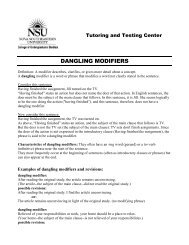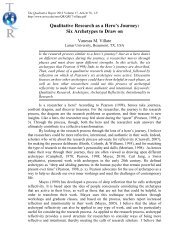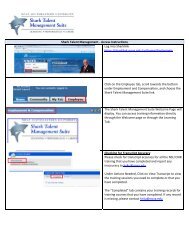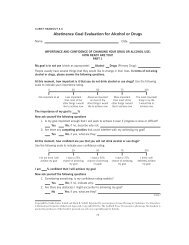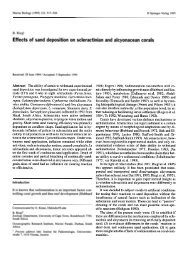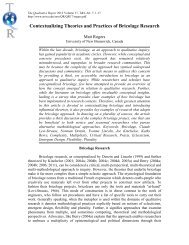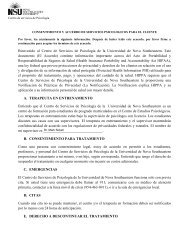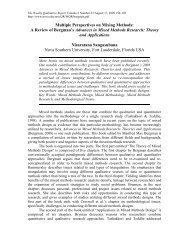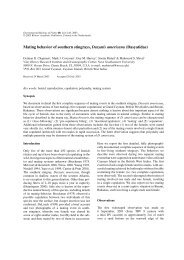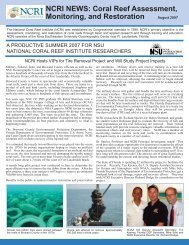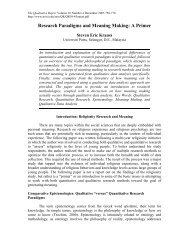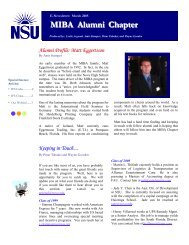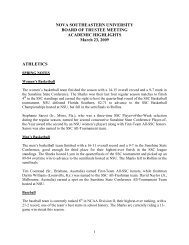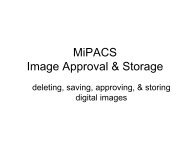11th ICRS Abstract book - Nova Southeastern University
11th ICRS Abstract book - Nova Southeastern University
11th ICRS Abstract book - Nova Southeastern University
You also want an ePaper? Increase the reach of your titles
YUMPU automatically turns print PDFs into web optimized ePapers that Google loves.
18-21<br />
Socio-Economic Monitoring (Socmon) As A Tool In The Management Of Marine<br />
Protected Areas: Participatory Process And Initial Results In Palawan Province,<br />
Philippines<br />
Michael PIDO* 1 , Sheila VERGARA 2 , Melissa MACASAET 3 , John Francisco<br />
PONTILLAS 4 , Marissa PONTILLAS 1 , Eva Marie PONCE DE LEON 1 , Delia<br />
MARTINEZ 3 , Filomeno RACUYA 4<br />
1 Palawan State <strong>University</strong>, Puerto Princesa City, Philippines, 2 Conservation International-<br />
Philippines, Quezon City, Philippines, 3 City Government of Puerto Princesa, Puerto<br />
Princesa City, Philippines, 4 Palawan Council for Sustainable Development Staff, Puerto<br />
Princesa City, Philippines<br />
Methodological tools in the assessment of bio-physical parameters in marine protected<br />
areas (MPAs) have been fairly standardized. The same level of consensus is not yet<br />
reached in assessing the human dimension’s socio-economic and governance variables.<br />
Socioeconomic Monitoring (SocMon) is a standardized set of guidelines on how to<br />
conduct socio-economic monitoring for collecting and analyzing basic socio-economic<br />
data useful for coastal management As a methodological tool, SocMon was employed to<br />
assess the awareness of people's dependence on marine resources, perceptions of resource<br />
conditions, threats to marine resources, use levels, and status of governance of two<br />
locally-managed MPAs in Puerto Princesa City, Palawan Province, Philippines.<br />
Preliminary results show that there is an almost equal number of male and female<br />
residents; almost half of the population are 20 years and below; few adults (barely 10%)<br />
belong to a stakeholder organization; a quarter reached high school level; and the migrant<br />
population now comprise nearly three quarters. They generally perceive the natural<br />
resources’ status to be either good or very good. Male and female respondents share<br />
similar positive attitudes towards non-market and non-use values of resources. Coastal<br />
communities are aware of temporal benefits of marine resources and they would put a<br />
higher value on future benefits (such as bequest values) rather than on current needs. In<br />
the order of decreasing importance, threats to resources identified were: rampant cutting<br />
of mangroves; destructive fishing activities for corals; and pollution for beaches. Overall,<br />
the method was found very useful in providing basic socio-economic information and has<br />
huge potential for between and across sites comparison to better inform management<br />
decisions, including communication with stakeholders, and to form a baseline for current<br />
socio-economic conditions of MMAs and coral reef areas. Methodologically, SocMon<br />
has potential for large-scale use in the Philippines and Southeast Asia by virtue of its ease<br />
in field application and data analysis.<br />
18-22<br />
Socio-Economic Status Of Communities Dependent On Coral Reefs in The Western<br />
Indian Ocean<br />
Innocent WANYONYI* 1 , David OBURA 2 , Delphine MALLERET-KING 1<br />
1 socmon Wio, Cordio Ea, Mombasa, Kenya, 2 corals, Cordio Ea, Mombasa, Kenya<br />
Coral reefs form the basis of the livelihoods of hundreds of thousands of people in the<br />
region. Numerous poor coastal households depend very highly on marine resources often<br />
as a last economic resource for food and income, through extractive uses such as fishing.<br />
Climatic change, destructive fishing, sand mining, pollution etc threaten coral reefs in the<br />
Western Indian Ocean (WIO) region. To manage resources effectively, it is essential to<br />
understand the context within which marine resource users live, their livelihood<br />
constraints and opportunities. It is increasingly recognised in the region that for resource<br />
management to be effective in the long term, MPA and fisheries management need to<br />
adapt and respond to changes in marine resource users’ socio-economic context. The<br />
Socio-economic Monitoring Initiative for Coastal Managers of the Western Indian Ocean<br />
(SocMon WIO) aims to increase coastal manager’s capacity to understand and<br />
incorporate the socio-economic context into coastal management programmes. SocMon<br />
WIO is a regional programme that builds on local-level monitoring systems. SocMon<br />
approach is based on community members’ participation, it is implemented locally at site<br />
level by relevant projects, marine protected area authorities, local area management<br />
authorities, fisheries officers or community groups. The SocMon WIO sites include eight<br />
managed as MPAs, three ICM/Co management sites and four are either fisheries<br />
management or co-management as well as Eco-region sites of regional importance within<br />
the East Africa Marine Eco-region (EAME). The SocMon WIO network expanded to 15<br />
sites across the region in 2007. The Results are presented here for pioneer SocMon WIO<br />
sites as sample monitoring data collected by the various sites to address their respective<br />
management needs. Diani-Chale site had 66% of households that undertook marine<br />
related livelihood activities and 25% households involved in fisheries alone.<br />
Oral Mini-Symposium 18: Reef Status and Trends<br />
18-23<br />
Lessons Learned from Socio-economic Monitoring (SocMon) and Marine Protected Area<br />
Management Effectiveness (MPA-ME) Evaluation in the Caribbean<br />
Maria PENA* 1 , Patrick MCCONNEY 1<br />
1 Centre for Resource Management and Environmental Studies (CERMES), The <strong>University</strong> of<br />
the West Indies, Cave Hill Campus, Barbados, Bridgetown, Barbados<br />
Socio-economic Monitoring at Negril Marine Park (NMP), Jamaica, was implemented from<br />
2004 to 2006 aimed at obtaining sound socio-economic information useful for decision-making.<br />
The assessment was linked to the simultaneous formulation of the first fisheries management<br />
plan for the NMP. The application of the SocMon Caribbean methodology to this project was<br />
informally evaluated by the Centre for Resource Management and Environmental Studies<br />
(CERMES), <strong>University</strong> of the West Indies (UWI) in Barbados. The project followed the<br />
SocMon methodology reasonably well, and the methods used were largely successful in<br />
achieving intended outcomes. The major deficiency in the project was lack of institutional<br />
capacity to undertake some tasks.<br />
CERMES Regional Project on Enhancing Management Effectiveness at Three Marine<br />
Protected Areas in St. Vincent and the Grenadines, Jamaica and Belize was implemented from<br />
2005 to 2007 to evaluate management effectiveness of MPAs at these sites. The project utilised<br />
methods set out in the guide<strong>book</strong> “How is your MPA doing?” for evaluating management. The<br />
process of evaluating management effectiveness in order to implement adaptive management<br />
was new to all study sites and therefore was a learning process. Primary lessons learned<br />
included an appreciation for evaluating management; the need for management agencies to<br />
undertake evaluation tasks based on available resources; the need for stronger science training<br />
for evaluation; the importance of presentation and validation of results and an awareness of<br />
stakeholder perceptions of management efforts.<br />
This paper reports on the practical lessons learned from applying the SocMon Caribbean<br />
methodology to socio-economic monitoring at the NMP; and biophysical, socio-economic and<br />
governance assessment outlined in “How is your MPA doing?,” for evaluating MPA<br />
management effectiveness at specific MPAs in the Caribbean.<br />
18-24<br />
Status And Trends in Socioeconomic Factors Affecting The World’s Coral Reefs<br />
Christy LOPER* 1 , Robert POMEROY 2 , Patrick MCCONNEY 3 , Arie SANDERS 4 , Gaya<br />
SRISKANTHAN 5 , Khulood TUBAISHAT 6 , Innocent WANYONYI 7 , Sheila VERGARA 8 ,<br />
Caroline VIEUX 9<br />
1 NOAA, Washington, DC, 2 <strong>University</strong> of Connecticut, Groton, CT, 3 <strong>University</strong> of the West<br />
Indies, St. Michael, Barbados, 4 <strong>University</strong> of Zamorano, Tegucigalpa, Honduras, 5 IUCN- The<br />
World Conservation Union, Colombo, Sri Lanka, 6 PERSGA- Regional Organization for<br />
Conservation of the Environment of the Red Sea and Gulf of Aden, Amman, Jordan, 7 CORDIO<br />
East Africa, Mombasa, Kenya, 8 Conservation International- Philippines, Manila, Philippines,<br />
9 SPREP- South Pacific Regional Environment Programme, Apia, Samoa<br />
This presentation aims to address two primary questions: (1) What are the current status and<br />
trends in socioeconomic factors affecting the world's coral reefs? and (2) How have<br />
socioeconomic monitoring programs contributed to coral reef research, conservation and<br />
management? In coral reef conservation, understanding socioeconomic factors is critical to the<br />
success of management tools used to conserve coral reefs.<br />
Since 2000, the Global Socioeconomic Monitoring Initiative for Coastal Management<br />
(SocMon) has facilitated socioeconomic monitoring in approximately 40 sites in six regions:<br />
Caribbean, Western Indian Ocean, Southeast Asia, Pacific, Red Sea, and South Asia. A critical<br />
gap in this data collection has been a coordinated review and analysis of socioeconomic<br />
information at the global and regional levels. Moreover, most of the data that has been<br />
collected has not previously been accessible to coastal managers, decision makers or donor<br />
agencies.<br />
By working with global partners to synthesize individual SocMon site assessments, this study<br />
has delineated trends in factors such as regional and global awareness of people's dependence<br />
on coral reefs, perceptions of reef conditions, threats to coral reefs, use levels, and status of<br />
governance around the world. Access to all of this data is now provided through a Global<br />
Socioeconomic Database, a web-enabled resource developed by WorldFish Center in Malaysia.<br />
This is a seminal study in the understanding of socioeconomic factors impacting coral reefs.<br />
Never before has a comprehensive survey of socioeconomic assessments of coral reef areas<br />
been undertaken. The results fill a critical need by advancing a global and regional<br />
understanding of human interactions with and dependence on coastal resources.<br />
155



